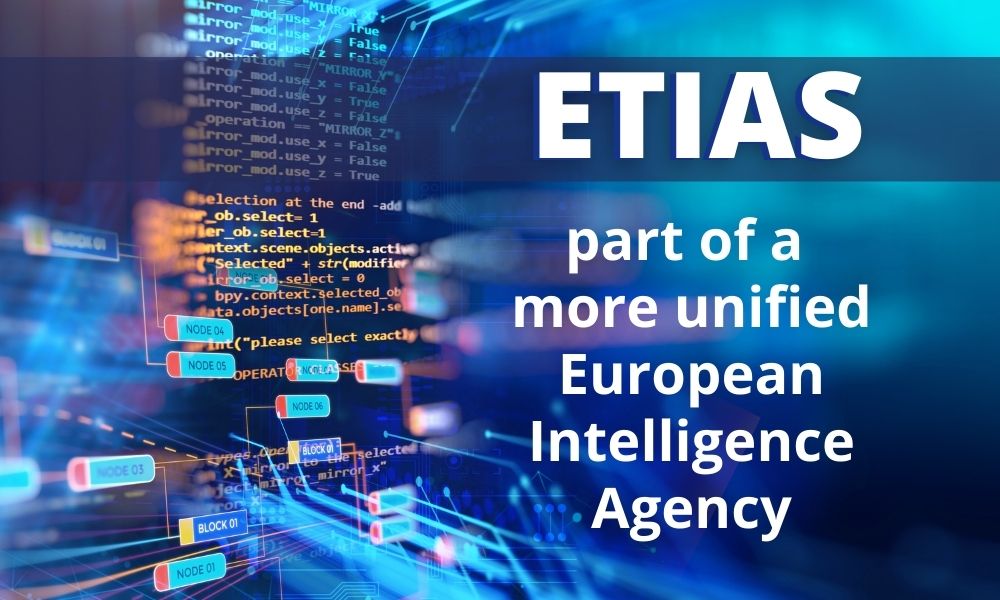
ETIAS as part of Unified European Intelligence Agency?
By jmarble on Fri, 04/30/2021 - 00:28
How the ETIAS will complement European Union intelligence and information systems
The Schengen Area of Europe is a 26-nation region that allows its citizens to travel freely across the internal borders. It has been incredibly easy for non-Schengen nationals to cross these borders as well, which has generated a lot of security risks for Europe. Risks the EU has been working to resolve. The Electronic System for Travel Authorization, “ETIAS,” may become a complementary part of the security of the region’s borders.
The European Commission (the executive branch of the European Union) is taking a multi-pronged approach to improving border security while also making border crossings more efficient. Thus, the European Travel Information and Authorization System will be part of a larger combined effort from various existing European intelligence systems.
What is the European Travel Authorization and Information System?
ETIAS was developed by the European Commission in an effort to improve security by pre-screening travelers from outside of the Schengen Area. This authorization system will retain information about short-term and long-term travelers.
The ETIAS visa waiver will work like this:
- Apply online for travel authorization by providing biographical and passport information
- Your application will be cross-checked with European security databases to identify security risks
- Approved travelers will have the visa waiver attached to their passport digitally, which will be valid for up to three years.
Once you are approved for travel, you present your passport at the external Schengen border of the first country you plan to enter, and you will be free to travel across internal borders without additional crossing checks. Note: Ultimately, the border agents will have final say as to who may enter the Schengen Zone. ETIAS is authorization to travel without a visa.
Each traveler's information will be stored in a centralized database that various European intelligence agencies will have access to. These combined databases will allow better tracking of major security concerns such as irregular migration and trafficking.
How does ETIAS help strengthen Europe’s borders?
In the days of traveling with a passport and a can-do attitude, the European Union was in the dark about a lot of border activity. There was no precise way to identify short-term travelers or how long they have been in the region, which leaves the door wide open for security risks and migration issues such as overstaying.
At its core, ETIAS is a way to pre-screen any travelers inbound to Europe. Security risks such as existing persons of interest will be flagged before they can cross the border, in part because your ETIAS application will be processed through several security databases.
US Citizens: Do I need the ETIAS visa waiver?
Once the ETIAS program launches (currently expected late 2022 or early 2023), all US citizens will need to apply for either:
The short-term travel visa waiver OR a traditional visa for Schengen Area travel.
Once the electronic system authorizing visa-free travel is effective, Americans will not be able to travel to Europe with just a passport as their authorization. Luckily, the application process is entirely online and is expected to take minutes to process for approval. However, the application must be filled out correctly in order to ensure approval. Discrepancies in an application can result in a longer wait time or even denial of the travel waiver for Schengen Area travel.
When it is time to apply, the ETIAS application agents can here at etias-europe.us (HOME) can help you through the process so you don’t have to wait any longer than you need to.
Is there a central intelligence agency for Europe?
Not exactly. The European Union Intelligence and Situation Centre (EU INTCEN) is widely considered to be the central intelligence agency for the EU, but unlike the US Central Intelligence Agency, EU INTCEN is not considered a full intelligence agency.
There are several law enforcement branches that handle security and intelligence concerns, and EU INTCEN has evolved to work with and enhance these branches. One component of EU INTCEN is Europol.
What is Europol?
As we mentioned earlier, Europol is one arm of the EU INTCEN. Essentially, it’s the central law enforcement body of the European Union. Europol works with other agencies, including border security, to fight security priorities. These priorities include cybercrime, terrorism, and trafficking.
According the Europol website, “Our position at the heart of the European security architecture allows us to offer a unique range of services and to serve as a: support centre for law enforcement operations; hub for information on criminal activities; and centre for law enforcement expertise. Analysis is at the core of our activities. Our criminal analysts are among the best trained in Europe. They use state-of-the-art tools to support investigations by law enforcement in Member States on a daily basis.”
Europol has the ability to track and fight crime at the multinational level, and the combined efforts of intelligence agencies, including Europol, will give them access to multiple security databases.
The ETIAS is one such security database. It will be used in conjunction with the Entry Exit System, the Schengen Information System, and the European Criminal Records and Information System to create a robust screening and risk prevention system.
Are you ready for ETIAS?
The European Travel information and Authorization System waiver will be required for all American short-term travelers starting in late 2022 or early 2023. To avoid processing delays, your application must be 100% accurate. Sign up for our newsletter to get the latest European travel updates.











Add new comment